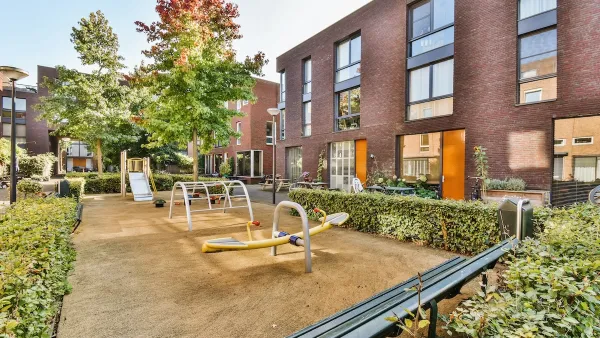Instead of "Bikers First!" or "Creative Class First!" James Siegel, president of Kaboom!, proposes an alternative for cities: "Kids First!"
"Our nation’s future is inextricably tied to the future of kids in cities," writes James Siegel in response to a controversial series of articles in Governing and the Washington Post questioning the necessity of building kid-friendly cities. Or as, Siegel put it: "Skeptics argue that cities should focus on attracting young professionals without kids because it’s easier to meet their needs."
Siegel's response, in a nutshell: "Unfortunately, those who want to turn cities into childless playgrounds for young adults fail to distinguish between cost and value. Yes, it costs money to invest in good schools and parks, playgrounds, and other opportunities to play. But it also generates a significant return on investment — economically and civically."
As a new rallying cry to counter the more popular narratives of urban development that supports young, affluent professionals, Siegel proposes a new rallying cry: "Kids First!" He also goes on to detail some of the projects around the country living up to that model.
FULL STORY: Kids First: What’s Good for Kids Is Good for Cities

National Parks Layoffs Will Cause Communities to Lose Billions
Thousands of essential park workers were laid off this week, just before the busy spring break season.

Retro-silient?: America’s First “Eco-burb,” The Woodlands Turns 50
A master-planned community north of Houston offers lessons on green infrastructure and resilient design, but falls short of its founder’s lofty affordability and walkability goals.

Delivering for America Plan Will Downgrade Mail Service in at Least 49.5 Percent of Zip Codes
Republican and Democrat lawmakers criticize the plan for its disproportionate negative impact on rural communities.

Test News Post 1
This is a summary

Test News Headline 46
Test for the image on the front page.

Balancing Bombs and Butterflies: How the National Guard Protects a Rare Species
The National Guard at Fort Indiantown Gap uses GIS technology and land management strategies to balance military training with conservation efforts, ensuring the survival of the rare eastern regal fritillary butterfly.
Urban Design for Planners 1: Software Tools
This six-course series explores essential urban design concepts using open source software and equips planners with the tools they need to participate fully in the urban design process.
Planning for Universal Design
Learn the tools for implementing Universal Design in planning regulations.
EMC Planning Group, Inc.
Planetizen
Planetizen
Mpact (formerly Rail~Volution)
Great Falls Development Authority, Inc.
HUDs Office of Policy Development and Research
NYU Wagner Graduate School of Public Service





























